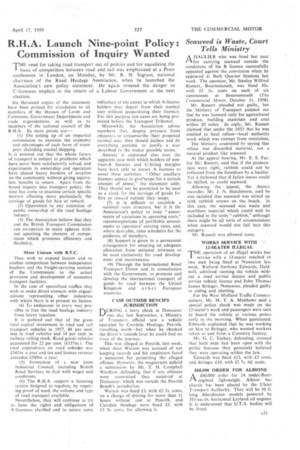R.H.A. Launch Nine-point Policy:
Page 33

If you've noticed an error in this article please click here to report it so we can fix it.
Commission of Inquiry Wanted• THE need for taking road transport out of politics and for equalizing the basis of competition between road and rail was emphasized at a Press conference in London, on Monday, by Mr. R. N. Ingram, national chairman of the Road Haulage Association, when he launched the Association's new policy statement. He again stressed the danger to C-licensees implicit in the return of a Labour Government at the next election.
Six thousand copies of the statement have been printed for circulation to all members of the Houses of Lords and Commons. Government Departments and trade organizations, as well as to members of the national council of the R.H.A. Its main points are:—
(1) The setting up of an impartial commission to examine the economy and advantages of each form of transport. iiicluding coastal shipping.
It is pointed out that the whole future of transport is subject to problems which have never been satisfactorily solved, and experiments in Ownershipand operation have placed heavy burdens of taxation on the community without giving equivalent benefits in return. Apart from the broad inquiry into transport policy, the time has come to examine certain specific matters affecting more particularly the carriage of goods for hire or reward.
(2) Opposition to any extension of public ownership of the road haulage industry.
(3) The Association believe that they and the British Transport Commission can co-opeiate in many spheres without upsetting the element of compe-' :titian which promotes efficiency and flexibility,. • •• More Liaison with B.T.C.
• They wish to expand liaison and to confine competition between independent hauliers and the freight-carrying sections of the Commission to the actual provision and development of economic transport facilities, In the case of specialized traffics they wish to make direct contacts with organizations representing other industries with which there is at present no liaison.
(4) To endeavour in every way possible to free the road haulage, industry from heavy taxation.
It is pointed out that of the gross total capital investment in road and rail transport vehicles in 1957, 86 per cent. was in road vehicles and 14 per cent, in railway rolling stock. Road goods vehicles accounted for 22 per cent. (£137m.). The total expenditure on road vehicles was 1545m. a year and tax and licence revenue exceeded £500m, a year.
(5) Formation of a new Joint Industrial Council, including British Road Services, to deal with wages and conditions.
(6) The R.H.A. support a licensing system designed to regulate, by requiring proof of need, the volume and type of road transport available.
Nevertheless, they will continue to try to have the rights and obligations of A-licensees clarified and to secure some indication of the extent to which A-licence holders may depart from their normal user without jeopardizing their licences. For this purpose test cases are being promoted before the Transport Tribunal.
Meanwhile, the Association advise members :hat, despite pressure from objectors to circumscribe their proposed normal user. they should declare and di:) everything possible to justify a user described in the widest possible terms.
Anxiety is expressed also over the apparent ease with which holders of contract-A licences and C-hiring margins have been able to secure A licences to cover these activities. " Other ancillary licences appear to give-scope for a certain amount of abuse." the statement adds. They should not be permitted to be used as a cloak for the carriage of goods for hire or reward outside their scope.
(7) It is difficult to establish a national rates structure, but it is the Association's policy to issue " assessments of Variations in operating costs," recommeudatiorts pf justifiable amendments to operators' existing rates, and, where desirable; rates schedules for the guidance. of Members.
(8) Support is given to a permanent arrangement for ensuring an adequate allocation from national revenues .to be used exclusively for road development and maintenance.
(9) Through the International Road Transport Union and in consultation with the Government, to promote and develop the international transport of goods by road between the United Kingdom and other European Countries.
CASE OUTSIDE BENCH'S JURISDICTION nURING a lorry check at Doncaster one day last September, a Ministry of Transport official saw a vehicle operated by Carrdale Haulage, Penrith. travelling north—but when he checked the driver's records later he could find no trace of the journey.
This was alleged at Penrith, last week, when Alan Watson was accused of not keeping records and his employers faced a summons for permitting the alleged offence. However, the magistrates upheld a submission by Mr. T. H. Campbell Wardlaw, defending, that if any offences were committed they occurred at Doncaster, which was outside the Penrith Bench's jurisdiction.
Watson was fined £3, with £2 2s. costs, on a charge of driving for more than 11 hours without rest at Penrith, and Carrdale Haulage werefined £5, with 13 3s. costs, for allowing it.




































































































